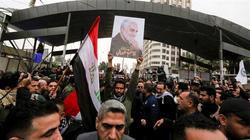 The assassination of Iran's Lieutenant General Qassem Soleimani was a strategic mistake made by the White House that will lead to geopolitical consequences, a senior Iranian diplomat says.
The assassination of Iran's Lieutenant General Qassem Soleimani was a strategic mistake made by the White House that will lead to geopolitical consequences, a senior Iranian diplomat says. RNA - "The terror [attack] on General Soleimani was a strategic mistake by the US, which led to a major turning point in West Asia and the Persian Gulf that will have geopolitical consequences," Iranian Deputy Foreign Minister for Political Affairs Abbas Araqchi said on Sunday.
"Now the region's history can be divided into before and after this incident, particularly after Iran’s strong blow that made a change in the strategic equations in the region and power arrangement between Iran and the US," he said, referring to Iranian missile strikes on a major US base in Iraq.
Araqchi warned those who were happy with the Iranian commander's martyrdom that his loss has only boosted the power of the resistance front and helped promote its goals.
The Iranian diplomat emphasized that after the Islamic Revolution Guards Corps (IRGC) gave a retaliatory response to the United States, Washington "was not able to respond and the biggest change in regional equation" after Soleimani's assassination took place.
"The outcome of this issue was [a new] strategic balance and strategic deterrence between Iran and the US, which is not a simple matter," he pointed out.
On January 3, the United States assassinated General Soleimani, the commander of the Quds Force of Iran’s Islamic Revolution Guards Corps (IRGC), among others in a set of airstrikes against the Iraqi capital of Baghdad on US President Donald Trump's order. Soleimani has earned reputation as West Asia’s most revered anti-terror commander due to his indispensable contribution to defeating terrorist outfits such as Daesh across the region.
The strikes also led to the martyrdom of second-in-command of Iraq’s Popular Mobilization Units (PMU) Abu Mahdi al-Muhandis along with eight other Iranians and Iraqis
In retaliation, the IRGC fired volleys of ballistic missiles on January 8 at the Ain al-Assad air base in the western Iraqi province of Anbar, and another facility in Erbil, the capital of the semi-autonomous Iraqi Kurdistan, both of which housed US forces.
Leader of the Islamic Revolution Ayatollah Seyyed Ali Khamenei said on Friday that the assassination of the top Iranian commander disgraced the US as it had to own up to the "terrorist" action and see its image dealt a blow by Iran's retaliation.
"The day the missiles of the Islamic Revolution Guards Corps crushed the US base is one of the days of God. The Guards' response was a major blow to America's fearsome superpower image," the Leader told a huge crowd in Tehran Friday.
In an interview with Times Now published on Saturday, Iranian Foreign Minister Mohammad Javad Zarif said the region is facing a "dangerous" situation due to the US combination of arrogance and ignorance.
"It is very dangerous because we have in fact a very dangerous combination in the United States: arrogance and ignorance," Zarif said in responses to a question about the future in the region.
"They (the Americans) do not know what is happening in this region and they are arrogant enough not to look for correct answers but simply to be gun-happy and take absolutely unacceptable, illegal measures," he added.
847/940